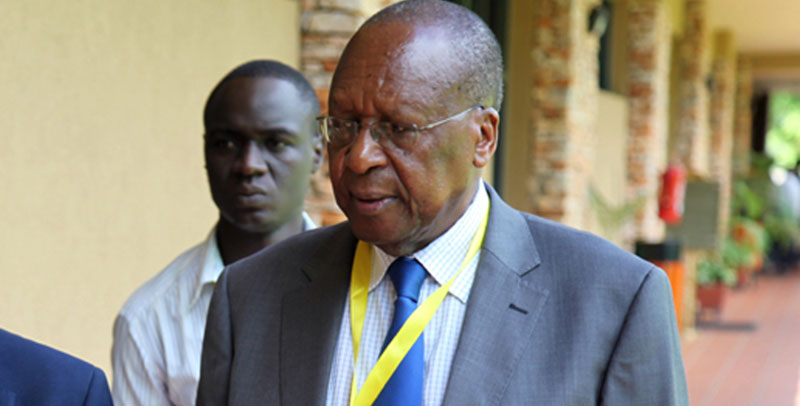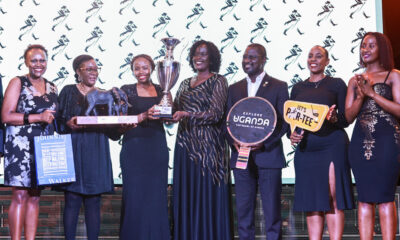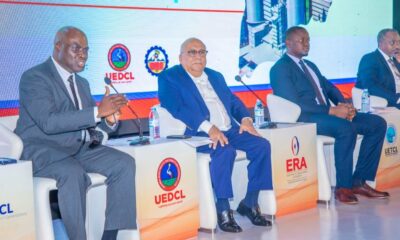Business
Fight for shares plagues Uganda’s first Gold refinery
Scarcely a month after this newspaper carried a story about Uganda’s first gold refinery, we have learned of a row that threatens to slow down the progress of the processing plant.
For starters, Alain Goetz, a renowned gold dealer from Belgium with similar business concerns in the United Arab Emirates (Dubai) is the majority shareholder in the Uganda’s USD20Bn refinery.
The other shareholder as well as chief promoter of the refinery in Uganda is former finance minister, Richard Kaijuka aka Sir Rich
Back to the shareholding row, a local associate of Alain, Barnabas Taremwa is its mastermind. Taremwa accuses Alain of denying him 0.5 percent shares in the refinery that he claims he is entitled to.
Taremwa says Alain locked him out of the refinery business by registering a company by the names African Gold Refinery (AGR) behind his (Taremwa’s) back.
Yet, Taremwa adds, he, Alain and Kaijuka, among others, had signed a joint venture agreement (JVA) in which he was supposed to acquire the shares he is suing for.
He tables the JVA dated December 12, 2014 as proof of his entitlement. According to the document, Kaijuka is also entitled to 0.5 percent shares in the refinery. Another shareholder is Timberafric International Limited (TIL). TIL joins Taremwa in suing Alain seeking to recover a total of 40% shares under the JVA. The rest
Taremwa says he helped Alain to set up foot in Uganda as well as set up the refinery by connecting him to the concerned authorities. As a result of such efforts, Taremwa says the ministry of finance and economic planning granted Alain’s investment tax holidays of up to five years.
To this end, Taremwa produces minutes of April 23, 2014, which he
Tareemwa claims to have done his part of the bargain, producing minutes of a meeting of April 23, 2014 which he, Goetz and Kaijuka had with the ministry of finance top guns led by PS Muhakanizi.
Among others, the PS guaranteed at the meeting and on behalf of government that finance would not be collecting taxes on all locally sourced materials or imported raw materials as well as all products under the refinery.
The PS also guaranteed that government would not levy duties on machinery that were to be used specifically in the refinery as well as allow the free repatriation of profits made by AGR.
Suing alongside a firm known as Timberafric International limited (TIL),
The duo lodged their lawsuit with the commercial division of the high court last week. Represented by Sebalu, Lule and company advocates, the duo ask court to freeze any business AGR is carrying out at the moment until when they have been allotted their shares.
Saying the company is operating under a ‘vague legal environment’ owing to the fact that it ‘does not’ have a board in place let alone its secretary; they assert that the freeze will help to facilitate the election of the board and its secretary as well as create a legal environment for the proper administration of AGR.
The above aside, the plaintiffs call upon Justice Chris Madrama to whom the dispute is allocated to investigate the entire process leading to the registration of AGR at the registrar of companies’ office. Tareemwa claims that AGR was registered behind his back and that of TIL.
He faults Goetz’s advice that the issue of shareholding should be fixed by a meeting of shareholders of AGR. Goetz alludes to this venue in an email he sent to Tareemwa on July 28, 2016.
Tareemwa had written to Goetz earlier, asking him to sort out the issue of shareholding. But Tareemwa says he and TIL cannot sit at such meeting as suggested by Goetz because he (Goetz) ‘deliberately’ omitted to register them with the registrar of companies as AGR shareholders.
Tareemwa opines therefore that the entities and individuals who sat initially and entered the Joint venture agreement should be the one to sit and resort to the document in question order to see who is entitled to and what percentage of the shares specified there under.
He faults Goetz for omitting to file the “true certificate’ indicating the shareholders of AGR, warning that the omission amounts to an illegality and is punishable under the Ugandan law.
Even if the shares were to be paid for, which he does not agree to, Tareemwa argues that such procedure could not have stopped Goetz from allotting them and ask for payment later.
“The shares so allotted could be taken away in case a shareholder had failed to pay for them,” Tareemwa notes.
Now that the lawsuit has been filed, the defendants will by procedure have to file their defenses individually. Thereafter, the file will be placed before a mediator to see if the parties to the dispute can resolve it among themselves. If mediation fails, the parties will proceed to pick out points where they agree on. As well as write those issues they do not agree on for the trial judge to hear and ultimately resolve.
But in the meantime, work at the refinery can only continue if court does not order against it pending the resolution on shareholding. Should court rule to suspend the work, the losers will be Ugandans never mind that the dictates of justice can demand such action.
Top guns from the ministry of Finance led by PS Keith Muhakanizi have already met the investor on directives of the president, going on to offer him tempting tax incentives in order to protect the worthwhile project from going to other interested countries.
We understand also that land has been already identified in Entebbe to facilitate building of the infrastructure at the site where the refinery is going to be situated.
But amidst all that pomp and optimism, there are now fears to suggest that the project could end up dying in its infancy– or at least– is likely to be subjected to pointless delays.
The fears emanate from the break out of a fight sparked by the allotment of shares in a company formed as a vehicle to deliver the refinery. The company is known as African Gold Refinery (AGR). This fight has actually seen one of the local associates of Goetz taking to litigation in order to obtain ‘his’ shares.
Businessman Barnabas Tareemwa is the local associate who has resorted to litigation in pursuit of what he says are his 0.5% shares in AGR. He is suing Goetz, Tony Goetz NV, which is the mother company for AGR and AGR itself.
We understand that Tareemwa served the court process on Goetz during the annual conference of Uganda Chamber of minerals and petroleum held last week at Serena Hotel. Goetz reportedly refused service personally. He told the process server to take the documents to his lawyers of Tem and company advocates whom he authorized to receive them on his behalf.
The other associate, but who is not suing for shares, is former minister Richard Kaijuka. Kaijuka is said to be the driver of AGR locally. It is not clear whether Kaijuka got his own allotted shares of 0.5%. Neither did we talk to Kaijuka nor did Tareemwa respond to our inquiries on Saturday regarding the status of Kaijuka’s shares.
What we know is that Kaijuka and Tareemwa were supposed to get shares for helping the investor set as well as gain feet in Uganda through talking to the powers that be to ease the whole process by, for instance, granting Goetz tax holidays, among other incentives.
Comments



















